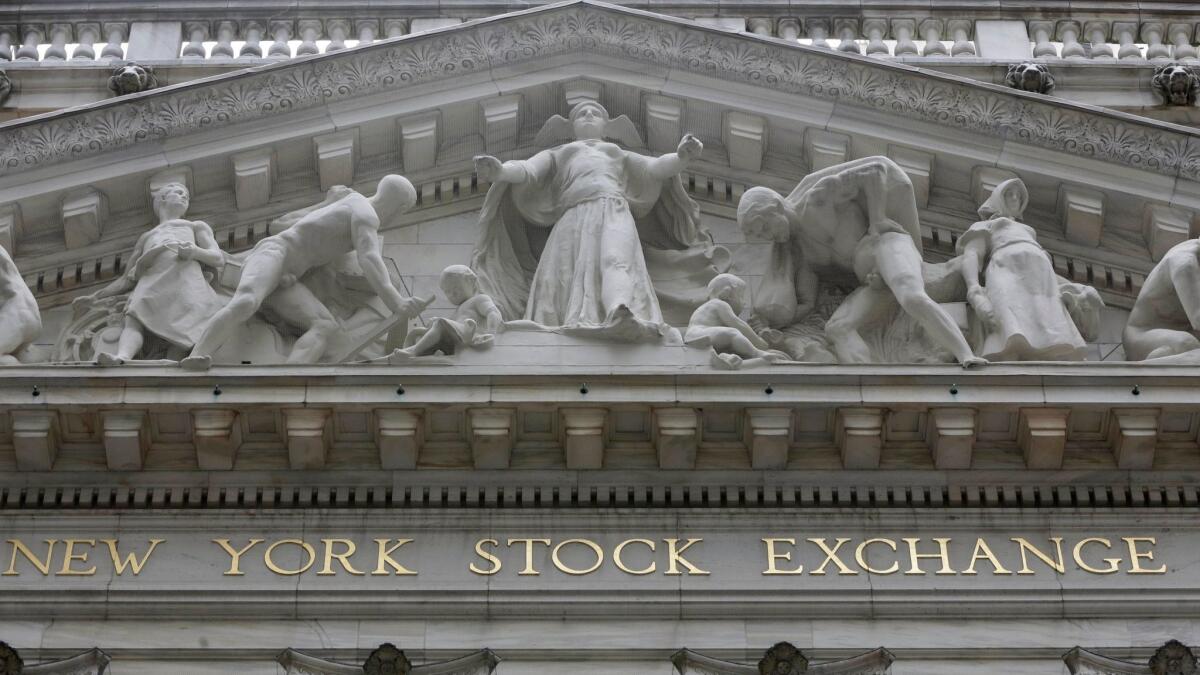Stocks are mostly flat; energy companies rise and banks fall

- Share via
U.S. stocks hardly moved Tuesday as investors were slow to dip a toe back into the market, although energy companies did climb with the price of oil and natural gas. Banks and retailers took losses.
Stock indexes flickered between tiny gains and losses throughout the day before they mounted a small rally in the last half hour of trading. Energy companies rose the most, and companies that make drinks, packaged foods and other household items also rose. Retailers and department stores slumped after Urban Outfitters warned of weak first-quarter sales and Ralph Lauren said it would close stores and cut jobs.
That came a day after automakers reported weak sales for March, which raised concerns about sales of other goods.
Eric Wiegand, senior portfolio manager at U.S. Bank’s Private Client Reserve, said that according to surveys, consumers are very confident in the economy, but considering high levels of employment and hiring, they’re not spending that much.
“We would like to see that confidence reflected in their actual consumption, and that’s been somewhat mixed,” he said.
The Standard & Poor’s 500 index rose 1.32 points, or almost 0.1%, to 2,360.16. The Dow Jones industrial average rose 39.03 points, or 0.2%, to 20,689.24. The Nasdaq composite rose 3.93 points, or 0.1%, to 5,898.61.
Slightly more stocks fell than rose on the New York Stock Exchange, and the Russell 2000 index, which contains smaller-company stocks, fell 1.49 points, or 0.1%, to 1,368.18.
This week investors will pore over reports on the U.S. economy, including Friday’s monthly jobs report. Trade agreements will be in focus as President Trump and Chinese President Xi Jinping meet Thursday and Friday.
Ralph Lauren dropped 4.5% to $77.73 after it said it would close stores and cut jobs in an effort to save money. The company will close its Fifth Avenue store in Manhattan less than three years after opening it. Urban Outfitters slid 3.1% to $22.49 after it said sales at older stores have fallen over the last two months.
Other retailers also lost ground. Department store Nordstrom sank 5.5% to $43.92 and L Brands, the owner of Victoria’s Secret, declined 4.4% to $43.77.
But e-commerce giant Amazon rose 1.7% to $906.83. Amazon stock is up 21% this year.
Handbag and accessories maker Kate Spade slumped 14.6% to $19.46 after Reuters said the company would take more time to negotiate a possible sale. The report cited anonymous sources and said that if Kate Spade were sold to a buyer like Michael Kors or Coach, it probably would be for less than the company’s recent valuation of $2.9 billion.
Benchmark U.S. crude rose 79 cents, or 1.6%, to $51.03 a barrel in New York. Brent crude, used to price international oils, climbed $1.05, or 2%, to $54.17 a barrel in London. Anadarko Petroleum shares rose 1.5% to $62.71.
Natural gas jumped 4.6% to $3.27 per 1,000 cubic feet. Southwestern Energy stock climbed 8.9% to $8.59, and Range Resources rose 4.2% to $29.76. Wholesale gasoline rose 3 cents to $1.72 a gallon. Heating oil rose 3 cents to $1.59 a gallon.
Bond prices fell. The yield on the 10-year Treasury note rose to 2.36% from 2.33%.
Banks took losses for the second day in a row after Monday’s sharp drop in bond yields. Lower bond yields force interest rates on loans lower, which cuts into banks’ profits. Capital One Financial slid 54 cents to $85.26 and Discover Financial Services fell 1.3% to $67.05.
The Commerce Department said U.S. factory orders kept growing in February thanks to greater demand for commercial aircraft. Boeing said it would sell $3 billion in aircraft to an Iranian airline, and its stock rose 1.2% to $178.70.
Manufacturers have been recovering recently from a rough patch that was caused by weak economies overseas and the strong dollar, which made U.S. goods more expensive. A measurement of business investment spending decreased for the first time since September.
Staples jumped 9.8% to $9.51 after the Wall Street Journal reported that the office supply company was talking to private equity firms about a potential sale. Staples tried to buy competitor Office Depot for $6.3 billion but gave up on that effort last May after regulators opposed the deal and a federal judge said it would reduce competition.
Gold rose $4.40 to $1,258.40 an ounce. Silver rose 11 cents to $18.32 an ounce. Copper rose 1 cent to $2.61 a pound.
The dollar slipped to 110.65 yen from 110.96 yen. The euro edged up to $1.0670 from $1.0665.
Britain’s FTSE 100 gained 0.5% and the CAC 40 in France rose 0.3%. In Germany, the DAX added 0.2%. The Japanese Nikkei 225 fell 0.9% as the yen gained against the U.S. dollar. The South Korean Kospi slipped 0.3%. Markets in Hong Kong were closed for public holidays.
UPDATES:
2:55 p.m.: This article was updated with closing prices, context and analyst comment.
This article was originally published at 8:10 a.m.
More to Read
Inside the business of entertainment
The Wide Shot brings you news, analysis and insights on everything from streaming wars to production — and what it all means for the future.
You may occasionally receive promotional content from the Los Angeles Times.










